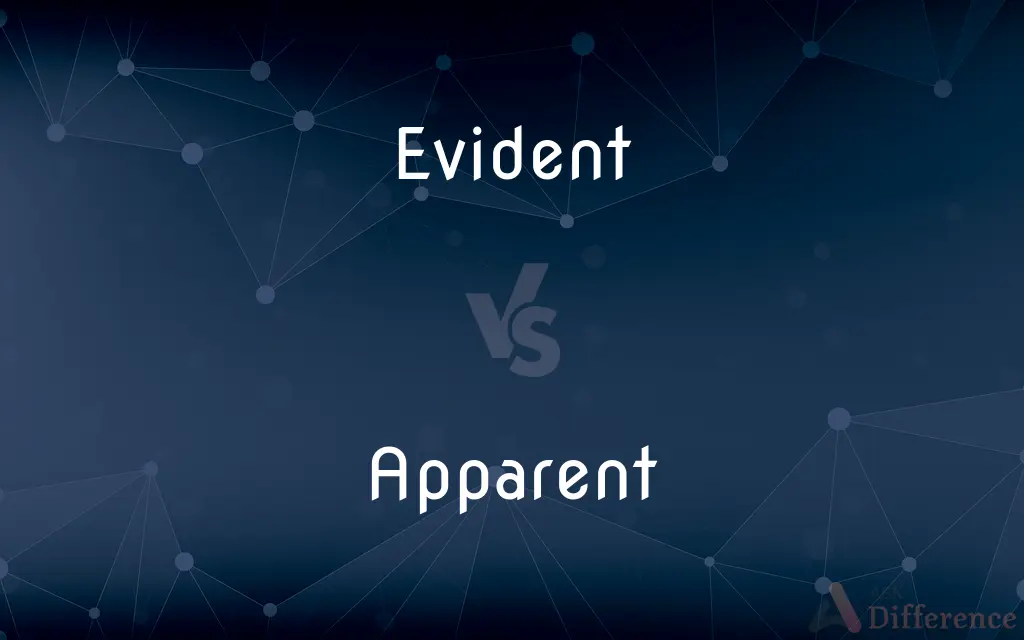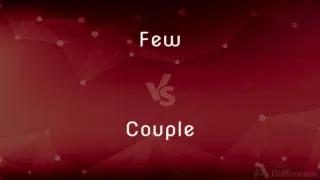Evident vs. Apparent — What's the Difference?
By Tayyaba Rehman & Fiza Rafique — Updated on April 4, 2024
Evident refers to something clearly understood or easily recognized, while apparent means seeming real or true but possibly not so.

Difference Between Evident and Apparent
Table of Contents
ADVERTISEMENT
Key Differences
Evident implies clarity and obviousness to the understanding or senses, based on direct proof or evidence. For example, the benefits of regular exercise are evident in improving cardiovascular health. On the other hand, apparent suggests something that seems to be true based on surface perception, but may require further validation. For instance, the cause of the accident was apparent to observers, yet further investigation was needed.
While evident facts or situations are unmistakably clear and leave little to no room for doubt, apparent scenarios might contain nuances or underlying complexities not immediately visible. Evident truths require no interpretation, relying on concrete evidence or experience, whereas apparent truths might be misleading or based on incomplete information.
In scientific contexts, evident can denote conclusions drawn from empirical evidence and experimentation, ensuring a higher degree of certainty. Conversely, apparent observations might be preliminary, based on initial data that could lead to different conclusions upon deeper analysis.
Evident often implies a level of transparency and openness that leaves no question about the validity of a statement or phenomenon. Apparent, however, can sometimes imply a level of superficiality, where things are taken at face value without digging deeper into their veracity.
In legal or formal discourse, evidence that is evident carries more weight and is more likely to influence outcomes decisively. Apparent evidence, while potentially persuasive at first glance, may require corroboration to establish its reliability and truthfulness.
ADVERTISEMENT
Comparison Chart
Definition
Clear to the sight or mind without ambiguity or doubt.
Visible or understood, but not necessarily real or true.
Basis of Judgment
Direct observation, concrete evidence.
Initial perception, surface observation.
Certainty
High certainty, leaving little to no room for doubt.
Lower certainty, may require further investigation.
Usage in Discourse
Used when referring to facts or truths that are undeniable.
Often used when there is room for interpretation or doubt.
Implications in Analysis
Implies a thorough understanding or clear proof.
Suggests a need for caution or further verification.
Compare with Definitions
Evident
Easily understood or recognized by the senses.
The benefits of a balanced diet are evident through improved health.
Apparent
Seeming to be most likely at the time, but not proven.
The apparent heir to the throne was not the king's biological child.
Evident
Clear and obvious to the mind or eye.
The evidence was evident in the case, leaving no doubt about the verdict.
Apparent
Visible or made clear, but subject to interpretation.
The symptoms of the disease were apparent to the doctor.
Evident
Directly observable, without the need for inference.
The damage to the building was evident even from a distance.
Apparent
Perceived by the senses or mind, but not confirmed.
The benefits of the new policy are apparent but yet to be proven.
Evident
Clearly revealed to the understanding.
The logic behind the decision was evident after the explanation.
Apparent
Seeming real or true, but not necessarily so.
His happiness was only apparent, as he was actually very stressed.
Evident
Unmistakably apparent, leaving no room for question.
It was evident from her smile that she was pleased.
Apparent
Ostensibly true, based on appearances.
The apparent cause of the fire was faulty wiring.
Evident
Easily perceived or understood; obvious.
Apparent
Clearly visible or understood; obvious
It became apparent that he was talented
For no apparent reason she laughed
Evident
Obviously true by simple observation.
It was evident she was angry, after she slammed the door.
Apparent
Seeming real or true, but not necessarily so
His apparent lack of concern
Evident
Clear to the vision; especially, clear to the understanding, and satisfactory to the judgment; as, the figure or color of a body is evident to the senses; the guilt of an offender can not always be made evident.
Your honor and your goodness is so evident.
And in our faces evident the signsOf foul concupiscence.
Apparent
Readily seen; visible
The animal's markings were immediately apparent.
Evident
Clearly apparent or obvious to the mind or senses;
The effects of the drought are apparent to anyone who sees the parched fields
Evident hostility
Manifest disapproval
Patent advantages
Made his meaning plain
It is plain that he is no reactionary
In plain view
Apparent
Readily understood; clear or obvious
The error was apparent to everyone in the audience.
Evident
Capable of being seen or noticed;
A discernible change in attitude
A clearly evident erasure in the manuscript
An observable change in behavior
Apparent
Appearing as such but not necessarily so; seeming
An apparent advantage.
Apparent
Capable of being seen, or easily seen; open to view; visible to the eye, eyely; within sight or view.
Apparent
Clear or manifest to the understanding; plain; evident; obvious; known; palpable; indubitable.
Apparent
Appearing to the eye or mind (distinguished from, but not necessarily opposed to, true or real); seeming.
Apparent
Capable of being seen, or easily seen; open to view; visible to the eye; within sight or view.
The moon . . . apparent queen.
Apparent
Clear or manifest to the understanding; plain; evident; obvious; known; palpable; indubitable.
It is apparent foul play.
Apparent
Appearing to the eye or mind (distinguished from, but not necessarily opposed to, true or real); seeming; as the apparent motion or diameter of the sun.
To live on terms of civility, and even of apparent friendship.
What Berkeley calls visible magnitude was by astronomers called apparent magnitude.
Apparent
An heir apparent.
I'll draw it [the sword] as apparent to the crown.
Apparent
Clearly apparent or obvious to the mind or senses;
The effects of the drought are apparent to anyone who sees the parched fields
Evident hostility
Manifest disapproval
Patent advantages
Made his meaning plain
It is plain that he is no reactionary
In plain view
Apparent
Appearing as such but not necessarily so;
For all his apparent wealth he had no money to pay the rent
The committee investigated some apparent discrepancies
The ostensible truth of their theories
His seeming honesty
Apparent
Readily apparent to the eye;
Angry for no apparent reason
Had no visible means of support
Common Curiosities
What does apparent mean?
Apparent means seeming to be true based on what one sees or understands, but not necessarily actually true.
Is evident stronger than apparent?
Yes, evident carries a stronger implication of truth and clarity than apparent.
How does evident differ from apparent in usage?
Evident is used when something is undeniably clear or obvious, while apparent is used when something seems to be true but may not be.
Is apparent skepticism necessary in scientific research?
Yes, apparent observations in science often require further investigation and empirical evidence to become evident.
What role does evidence play in making something evident?
Direct, concrete evidence is crucial in establishing something as evident.
In what situations is it better to use apparent rather than evident?
When indicating preliminary conclusions or observations that may still need verification.
Can something be apparent but not evident?
Yes, if it seems true based on initial observation but lacks conclusive proof.
Can something be both evident and apparent?
Yes, something can be both if it is clearly visible and seems true but still requires verification.
Can the use of evident and apparent change the perception of a statement?
Yes, using evident suggests certainty and clarity, while apparent might introduce doubt or the need for further proof.
How do legal contexts differentiate between evident and apparent?
Legal standards often require evidence to be evident rather than merely apparent to ensure fairness and accuracy.
How can educators distinguish between evident and apparent learning in students?
By assessing whether students’ understanding is clear and thorough (evident) or if it just seems so on the surface (apparent).
What does evident mean?
Evident means clearly visible or understandable, leaving no doubt.
Do evident and apparent have the same etymology?
No, they have different origins; evident comes from Latin "evidens," meaning obvious, while apparent comes from Latin "apparens," meaning appearing.
Can the distinction between evident and apparent affect decision-making?
Yes, decisions based on evident facts are likely more reliable than those based on apparent ones, which may require further investigation.
Why might something be only apparent?
Lack of full information or misleading initial observations can make something only apparent.
Share Your Discovery

Previous Comparison
Few vs. Couple
Next Comparison
Artifact vs. AntiqueAuthor Spotlight
Written by
Tayyaba RehmanTayyaba Rehman is a distinguished writer, currently serving as a primary contributor to askdifference.com. As a researcher in semantics and etymology, Tayyaba's passion for the complexity of languages and their distinctions has found a perfect home on the platform. Tayyaba delves into the intricacies of language, distinguishing between commonly confused words and phrases, thereby providing clarity for readers worldwide.
Co-written by
Fiza RafiqueFiza Rafique is a skilled content writer at AskDifference.com, where she meticulously refines and enhances written pieces. Drawing from her vast editorial expertise, Fiza ensures clarity, accuracy, and precision in every article. Passionate about language, she continually seeks to elevate the quality of content for readers worldwide.















































